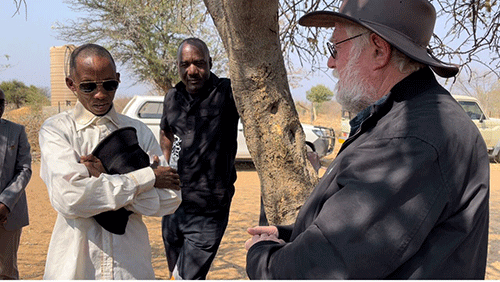BRAVO – An array of challenges prevents the San community at government’s Bravo resettlement project in the Kavango West region to thrive.
Illegal settlers, mainly from the Ohangwena region, invaded the resettlement farm and erected illegal fences, limiting grazing areas and intimidating the San community. The scarcity of water is another challenge wreaking havoc in the San community, who were resettled there through the national land resettlement programme.
“It looks on face value that it [the farm] has been invaded by other groups,” said land reform minister Calle Schlettwein when he visited the Bravo resettlement farm last week.
“The San people who were originally resettled on the scheme are now back in the corridors.
And their land that the State gave them with the cattle has vanished and disappeared, and they are probably in a worse situation than they were before.”
While visiting the farm, Schlettwein said the Bravo situation was a serious matter.
“The whole issue of illegal fencing and displacing of people from either the commonage or a resettlement farm that was given to them is a serious illegal activity that needs to be addressed with all seriousness, and we are determined to do that now,” he added.
“We have the legal tools to remove these fences, and even charge these people who illegally erect them. We will make sure that the policies of government that are aimed at assisting those who are vulnerable are taking effect and reach the necessary target group”, he stressed.
The minister noted that illegal fencing and settling is a problem not only in the two Kavango regions, but is a problem Namibia is facing in many regions, where people move in and through illegitimate ways get access to land without proper leaseholds or the authority of traditional authorities nor the involvement of land boards.
“And it is a whole series of events that need to be cleaned up and relooked at so that our resettlement programmes go back to what they are supposed to be,” he added.
Bartholomeus Kandjimi, an elder at Bravo settlement, told New Era during an earlier visit to the area that “there are some people who have invaded our community, and their livestock are damaging our crops and harvests during farming season. They cause destruction to our things. This area should only have inhabitants who have been resettled here.”
But, the community also has other challenges.
“We find it difficult to access basic services like clinics. It is tough to get national documents. We need a home affairs office, shops and other services which are needed by our community. Last year, a woman in labour died while being transported on a tractor to a nearby hospital, more than 60 km away. Getting an ambulance to come here is difficult,” said another settlement elder, Sipora Johannes.
Health services are accessed at Mpungu village, which is about 100km away. Other government services are acquired at Nkurenkuru, which is 150km away, or people cross over to Tsumeb in the Oshikoto region.
Johannes said the community is in dire need of water, as their boreholes need to be rehabilitated. Some solar panels at one borehole have also been stolen by visitors.
“Government has given our community livestock to practice farming, but we are struggling to get them water. They move long distances to where there are wells. Water is a problem here, and we don’t know where to go and knock,’’ she lamented.
Some community members who live close to the school have resorted to fetching water from there.
“Our councillor has deserted us. It is like we are not part of the Mpungu constituency. We have been asked by officials from the constituency office to give them our list of needs every now and then, but nothing comes from it,’’ she continued.
The community also has challenges of learners dropping out once they are about to complete primary schooling.
“Teenage pregnancy is high here. The school at Bravo will in future not have any San learners there because they are all getting married at a young age. Because their parents are not pushing their learners to go to school, they are reluctant. They drop out before even reaching grade 7. Their diploma is pregnancy. Maybe if we have a hostel, learners will be kept in school and they won’t have time for men, and they won’t drop out easily,’’ Johannes noted.
Another side of the coin was likewise revealed.
“As youths, we have no projects here that can keep us busy. No employment opportunity; there are no contraceptives like condoms. Health officials only visit our area once a year, and we don’t have money to go to places where we can get contraceptives,” said the youthful Josephine Hamukwaya, who was born in Bravo.
jmuyamba@nepc.com.na
Caption: (Bravo)



